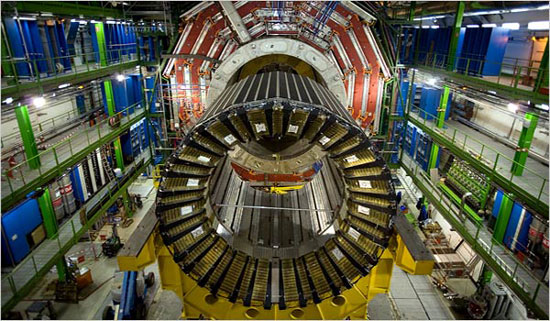
 Someone hit a switch today and began either the greenest or one of the most environmentally disastrous experiments in the world: The Large Hadron Collider. This atom-smashing particle accelerator, reports CNN, is designed to simulate conditions of the Big Bang that created the physical Universe. It carries a ridiculous price tag of $9 billion, and requires 14 trillion electron volts of energy. That's the energy equivalent to running all the households in Geneva (with a whopping annual electric bill of $30 million).
Someone hit a switch today and began either the greenest or one of the most environmentally disastrous experiments in the world: The Large Hadron Collider. This atom-smashing particle accelerator, reports CNN, is designed to simulate conditions of the Big Bang that created the physical Universe. It carries a ridiculous price tag of $9 billion, and requires 14 trillion electron volts of energy. That's the energy equivalent to running all the households in Geneva (with a whopping annual electric bill of $30 million).

Valerio Mezzanotti for The New York Times
One money guzzling, energy guzzling step into the unknown will use an Eiffel Tower's worth of metal, eight-story wheels of gold fan-shape boxes, thousands of miles of wire, and fat ductlike coils, according to The New York Times. The Collider will also consume 128 tons of liquid helium for cooling the superconducting magnets and three million DVDs, necessary to record all the data.
Then there's a chance, according to critics including physicists, that the experiment could suck the earth inside out, destroying us all in a mini black hole.
Which would not be particularly green.
The fact is Scientists at CERN, the European Organization for Nuclear Research, don't really know what the heck is going to happen. It's a wild leap into uncharted territory.
But understanding the science behind black holes could solve our oil and energy crisis in one fell swoop. In April 2006, a study released by the Kavli Institute for Particle Astrophysics and Cosmology at Stanford University suggested supermassive black holes are actually the most fuel efficient engines in the universe. Tapping black hole science, a car could get about a billion miles out of a gallon of gas. In Star Trek, as all Trekkies know, black holes are used to travel at the speed of light. But perhaps, in the not so distant future, we will simply use them to go to the grocery store.
More on the Large Hadron Collider on Huffington Post
::Marty Kaplan: Why I Have a Man Crush on the Large Hadron Collider
More from TreeHugger on the Large Hadron Collider
::Turn off the Large Hadron Collider to Save the World
::So long, and Thanks For All The Fish: Hadron Collider Turns On
::Former Chief UK Scientist Calls for Complete Removal of Fossil Fuel Dependence
More From Mairi Beautyman on Huffington Post
::Four Ways for a Stylish and Tasty Green Dinner Party
::From the Olympics to Sears, Wearing Recycled Bottles Goes Mainstream
::Clothing Made from Milk and Bottles Made of Paper? The Eco Design Revolution
::Terrorists or Heroes? Sea Shepherd Fights for Marine Life
::Does Terrorism Make us Travel Greener?